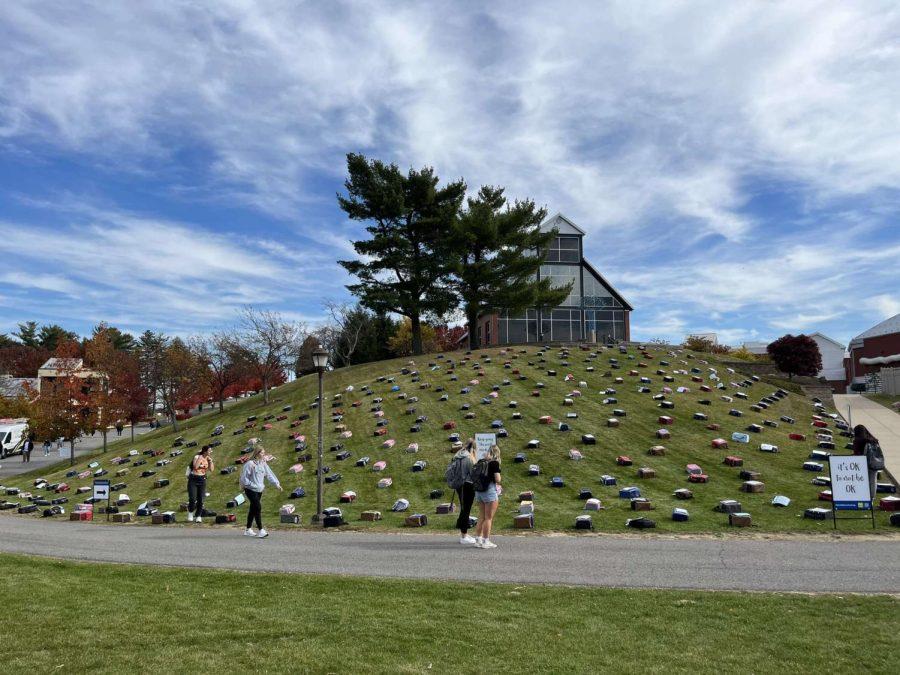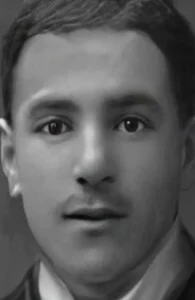Send Silence Packing Active Minds looks to destigmatize mental health
An assortment of backpacks representing lives lost to suicide.
October 25, 2022
If you or a loved one is experiencing suicidal thoughts please reach out to the suicide crisis line 988.
Robert Morris University’s Active Minds organization hosted Send Silence Packing, an event that looks to keep the conversation alive about suicide prevention and mental health awareness on October 25.
Active Minds coordinator, Kelsey Pacetti, spoke about the event. “Send Silence Packing itself promotes suicide prevention through story and resource sharing. So we’re here today to connect students to counseling, let them know help is available and people care about them.”
Backpacks featured stories from loved ones who have lost people to suicide and stories from the people who were lost by suicide. Approximately 1,000 backpacks were displayed on the lawn behind the chapel. Some of the backpacks were used by the victims of suicide.
Send Silence packing will travel to eight universities in the Pittsburgh area to continue its message of advocacy and ending the silence around mental health. The group has traveled all over the country as well as making over 200 stops at schools across the nation.
Active Minds shares many great tips including self-care, statistics and suicide prevention strategies.
The organization recommends self-care strategies including taking deep breaths, yoga and hiking, exercising, playing with a pet and meditation.
In its advocacy for suicide prevention, Active Minds uses a three-step V-A-R approach. Validate their feelings by saying “that makes sense”, “that sounds difficult”, “I’m sorry you’re struggling right now” and “it sounds like you are going through a lot right now.”
Step two is appreciation. Things that should be said in this stage are “Thank you for sharing”, “you are not alone”, “I’m here for you”, “I’m glad you told me what you’re going through.”
Step three of V-A-R is referring. Referring should sound like “sometimes taking time for self-care and listening to a comedy podcast helps me. Can we do that together?” “I’ve been using this meditation app. It’s really helped me slow down my thoughts.” The final thing that should be said in this stage is “I think it might be helpful to talk to someone. I can stay with you while we call/text a lifeline.”
Active Minds believes in education. Education on anxiety, depression and suicide.
Anxiety is a persistent mental illness that can linger even when external stressors are resolved. Anxiety includes many things like excessive worry, even when the perceived threat isn’t close to reality.
Depression is a longer-term illness that can become chronic. Symptoms include low energy levels, sleep, appetite, feelings of sadness, and feeling bad about one’s self. Depression can also lead to thoughts of suicide.
Suicide is the second leading cause of death among young adults. Friends are most likely to tell another friend they’re feeling suicidal before they tell anyone else.
39% of students experience a mental health issue.
“This event is such a powerful representation of why we need each other. We want students to know that they don’t have to suffer in silence. RMU is a special community and we truly are small enough to care about each other; and we need to,” said Sarah Walters from the RMU counseling center.
“Today’s event was meant to honor those individuals that we have lost to suicide, but also to emphasize the power of a supportive community. We need to check on each other and destigmatize help-seeking behaviors.”
“I hope our students walk away from this experience realizing that they’re never alone and that there’s always someone who wants to help.”












